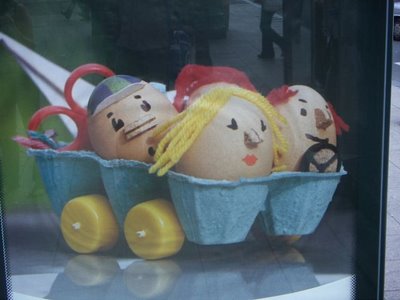Rêve d'Eléphant Orchestra - 06/12/2006@Sounds, Brussels

Michel Debrulle - d, perc
Stephan Pougin - d, perc
Etienne Plumer - d, tablas
Michel Massot - tba, tb, euphonium
Benoist Eil - g, banjo
Alain Vankenhove - tp, flh
Pierre Bernard - fl, b fl
In the late 80s and early 90s, a scene sprang up in Liège and around American trombonist Garrett List. It drew together all kinds of rhythms, opera, contemporary composition, improvisation, jazz, etc. People like Fabrizio Cassol, Michel Massot and Michel Debrulle and others came from there. Something of that period lives on in the Rêve d'Eléphant Orchestra, in the feeling of wildly disparate elements that fall into place neatly. Well, neatly enough, anyway: I mean, who layers a quick orientalising piccolo melody atop a big rock guitar riff with the brass playing synchronised car honks on the side - and makes it work?
The harmonie and fanfare are to Belgium what the brass band is to New Orleans. The Rd'EO borrows from those formats and their street parade energy and expands the rhythmic purview to include Indian sounds via the tablas and Benoist Eil's fretless guitar (Eil has replaced wildman/genius Jean-Yves Evrard), an African, collectivist kind of approach to percussion and Afro-American musics, along with a few tricky composing twists and some uncompromising improvisation. The whole thing is smothered in a junkyard circus aesthetic that effectively hides complexity and sophistication under layers of fun.
Michel Massot has always been the resident clown, but now he's joined by newcomer Alain Vankenhove. They both occasionally gesticulated, sang and danced, while playing impressively and expressively, putting emotion alongside the slapstick. "Ganesh Goes To Hollywood" expanded the comedy to the whole band, as a tablas intro was augmented by farmyard clucking and braying and followed by a funny, extremely vocalised trumpet solo with accomanying silly gestures.
Massot has long been making a compelling case for the euphonium as the perfect compromise between a tuba's power and a trumpet's agility. He would blow directly into his trombone's mute and make it sound uncannily like Miles using a wah-wah pedal, or use a plunger mute more traditionally and evoke a lost member of Ellington's brass section. Vankenhove matched this historical range, from gut-bucket growls to rhythmic unpitched air.
Having three drumsets (and other smaller implements) on stage should spell disaster - either hopelessly messy or unbearably loud. The Rd'EO percussion section, however, uses arrangements that lead not only to deep, interlocking polyrhythms, but also to textural complementarity. The latter makes up, in a way, for the lack of bass, as the percussion's lower frequencies fill its space.
The concert started with "Les folies de Cécile," a song I know well: when I first got the Rd'EO's debut album Racines du Ciel in 2001 or 2002, I spent many hours sitting in front of the stereo, resetting the track over and over again to learn it on tin flute. The humble Irish whistle was rather appropriate: it's the kind of melody that gets better the less sophisticated the instrument you play it on. "Les folies de Cécile" also serves as a handy summary for much of the Rd'EO's writing: either because it is recycled elsewhere, as in one song's eery whistling, or because its template - a catchy, exotic sing-song melody that opens up to floating collective improv over a deeply layered beat - permeates several other compositions.
It wasn't all extroverted craziness. When Pierre Bernard picked up the bass flute, space was opened up first for a peaceful duet with Eil and then for a mournful fluegelhorn solo over a slow 7/4 beat. Still, when the band came back for a well-deserved third encore, they couldn't help but triumphantly mime elephants (or mime triumphant elephants?), an arm in lieu of a trunk.
|